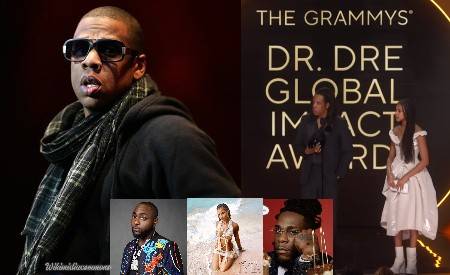Jay-Z’s Heartfelt Acceptance Speech and Tribute to Dr. Dre: OGM News– In a night filled with praise for the music industry’s finest at the Grammy Awards, Jay-Z, whose real name is Shawn Corey Carter, stood on the stage to accept an award with gratitude and humility. Expressing his appreciation for the honor, Jay-Z delivered a heartfelt speech, acknowledging the influence and impact of Dr. Dre on his career. He thanked Dre for opening doors and paving the way for artists to become true rock stars. The rap icon also reminisced about the transformative moments in hip-hop history, mentioning the iconic Run DMC and Aerosmith collaboration, and credited Dre for taking the genre to new heights.
Furthermore, Jay-Z extended his appreciation to the Black Music Collective, recognizing their efforts in providing scholarships for young creatives. This acknowledgment highlighted Jay-Z’s commitment to supporting the next generation of artists and the significance of fostering diversity and talent within the music industry.
Jay-Z Calls Out Grammy Awards for Historical Injustices
While expressing gratitude for his own recognition, Jay-Z did not shy away from critiquing the Grammy Awards for historical oversights and errors. Referencing past instances, Shawn Corey Carter highlighted the 1989 Grammy win by Will Smith and Jazzy Jeff for their boycott due to the lack of televised recognition. He shared a personal experience from 1998 when he boycotted the awards after being nominated for Best Rap Album, witnessing DMX’s omission despite two chart-topping albums that year.
The iconic rapper, Shawn Corey Carter emphasized the importance of getting awards right and urged the organizers to address past injustices. Despite the critique, his message was conveyed with love and a desire for positive change within the Grammy Awards. This public call for improvement reflects the evolving expectations within the music industry and the ongoing dialogue surrounding recognition and representation.
The Impact of Jay-Z’s Words on the Grammy Awards and the Industry
Jay-Z’s dual acknowledgment and criticism during the Grammy Awards sparked conversations within the music industry about the need for transparency and fairness in award ceremonies. His words resonated with artists and fans alike, shedding light on the historical discrepancies in recognizing diverse talent. The call for getting it right echoed the broader sentiment for inclusivity and accuracy in awarding artistic achievements.
As the industry continues to evolve, Shawn Corey Carter’s message serves as a reminder of the responsibility held by award shows to reflect the true diversity and excellence present within the music community. The Grammy Awards now face the challenge of addressing these concerns and ensuring that future ceremonies accurately represent the richness of talent within the ever-expanding landscape of music.

Jay-Z Criticizes Grammy Awards for Subjectivity and Overlooks in Major Categories
Amid the lavish praise showered upon the Grammy Awards, Jay-Z, also known as Shawn Corey Carter, took a bold stance by pointing out the subjectivity inherent in the selection process. In a candid moment, the iconic rapper, Shawn Corey Carter expressed gratitude for the love received but urged the awards show to strive for greater accuracy in their evaluations. He acknowledged the inherent subjectivity in music, emphasizing that not every performance or creation warrants applause.
The rap mogul then drew attention to a striking example, refraining from naming the artist directly but highlighting a discrepancy where someone with the most Grammys had never won Album of the Year. This observation prompted reflection on the effectiveness of the Grammy’s own metrics and raised questions about the consistency of their recognition criteria. Shawn Corey Carter’s comments resonated with those who believe in the need for fairness and objectivity in award ceremonies, creating a buzz around the industry.
The iconic rapper, Shawn Corey Carter Addresses Perceived Injustices
Jay-Z continued his critique by addressing the potential disappointment felt by artists, some of whom might believe they have been unjustly overlooked or placed in the wrong categories. The artist, known for his honesty, acknowledged his own experiences of feeling out of place and being in categories where he believed he didn’t belong. In a candid moment, the iconic rapper, Shawn Corey Carter emphasized that, in moments of nervousness, he chooses to speak the truth.

Furthermore, he extended his message beyond the Grammy Awards, urging individuals to persist and keep showing up in various aspects of life. As his daughter nervously looked on, Shawn Corey Carter encouraged everyone to continue striving for recognition and accolades they feel they deserve. This motivational message resonated not only with artists but also with a broader audience, reinforcing the importance of perseverance in the face of challenges.
Jay-Z’s Impact on the Grammy Conversation and Broader Recognition Issues
Jay-Z’s bold critique has sparked a significant conversation within the music industry about the subjective nature of award shows and the need for more transparent evaluation processes. His comments have reignited discussions around the perceived flaws in major award categories and the potential oversight of deserving artists. The industry now faces the challenge of reevaluating its recognition criteria and ensuring that awards reflect not only popularity but also artistic merit.
Beyond the Grammys, Jay-Z’s words serve as a rallying cry for artists and individuals to persist in the pursuit of their goals, irrespective of external recognition. This broader message resonates with the ethos of self-belief and determination, transcending the specific context of the Grammy Awards. As the industry continues to evolve, the iconic rapper, Shawn Corey Carter’s critique may catalyze positive changes in the way music awards are perceived and awarded, emphasizing the importance of fairness, accuracy, and perseverance.
Jay-Z’s Critique Echoes Sentiments of Discontent Among Nigerian Fans
Jay-Z’s recent criticism of the Grammy Awards resonates globally, and the sentiment finds echoes among Nigerian music fans who experienced disappointment during the 66th Grammy Awards. A video capturing a fan’s extreme reaction to Davido’s loss circulated widely on social media, triggering diverse reactions. Many Nigerians expressed their disappointment while others were taken aback by the fan’s excessive frustration.
The incident has sparked crucial discussions on the emotional investments fans make in their favorite artists and the profound impact international recognition, or its absence, can have on a fan base. The video protest, led by Nigerian social media personality Very-Dark-Man, condemned the Grammy Awards for awarding the Global Music Award to Susana Baca, whose album had not even reached 1 million views on YouTube. The critique extended to questioning why Grammy’s choices favored artists like Baca over hits like Burna Boy’s “I Told Them” and Davido’s “Timeliness.”
Very Dark Man’s Critique of Grammy Choices Resonates Across Social Media Platforms
Very-Dark-Man’s video post, captioned “Omo at this point Grammy is the most yeye music award,” has gone viral across social media platforms, garnering significant attention and sparking widespread conversations. In the video, Very Dark Man passionately voices his discontent with the Grammys, emphasizing the perceived mismatch between awards and actual popularity or impact. His critique not only addresses Davido’s loss but also questions the rationale behind awarding artists whose reach and influence may not align with the global popularity of other contenders.

The incident highlights the growing scrutiny of international music awards and the expectations fans have for them to accurately reflect the popularity and impact of artists globally. The viral nature of Very-Dark-Man’s video indicates a collective frustration within the Nigerian music community and a desire for award shows to recognize the influence and reach of artists accurately.
Davido’s Loss at the Grammys Amplifies Deep Disappointment Among Nigerian Fans
The aftermath of Davido’s loss at the 66th Grammy Awards has left a profound impact on Nigerian music fans, particularly those belonging to the ’30 Billion Gang.’ The disappointment reverberated through the community, leading to a palpable sense of outrage. This incident underscores the intense passions that Nigerian music fans harbor for their favorite artists and their aspirations for international recognition through prestigious awards like the Grammys.
The broader conversation initiated by Jay-Z’s critique, coupled with Very-Dark-Man’s video protest, sheds light on the evolving dynamics between artists, fans, and international awards. The incident prompts a reevaluation of the criteria used in selecting awardees, emphasizing the importance of aligning recognition with true global influence and popularity. As the dialogue unfolds, it remains to be seen whether the music industry will respond to the collective voice of discontent expressed by fans and influencers within the Nigerian music scene.
Table of Contents
Discover more from OGM News NG
Subscribe to get the latest posts sent to your email.














